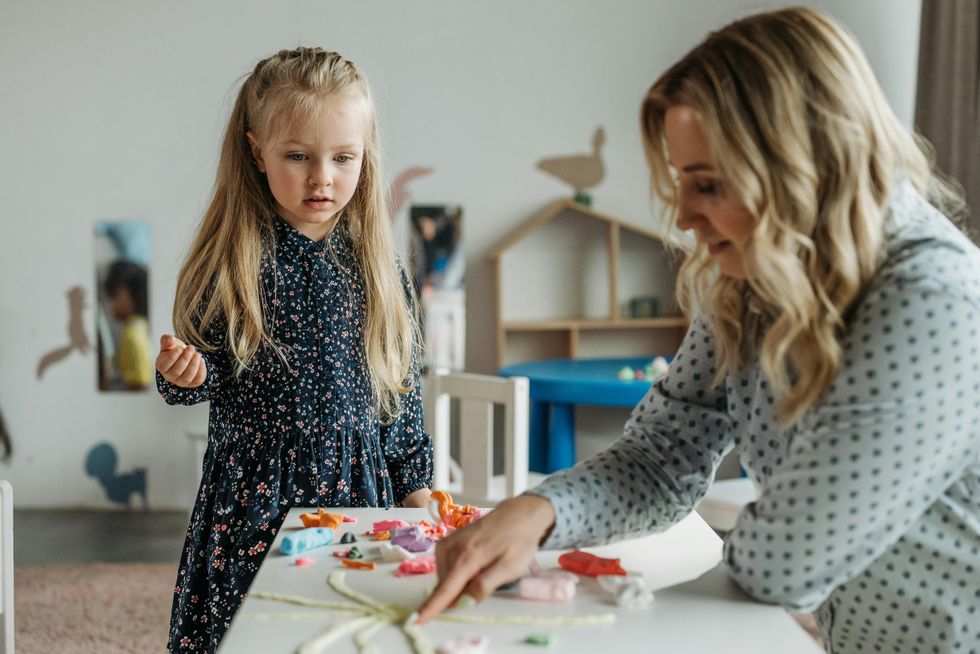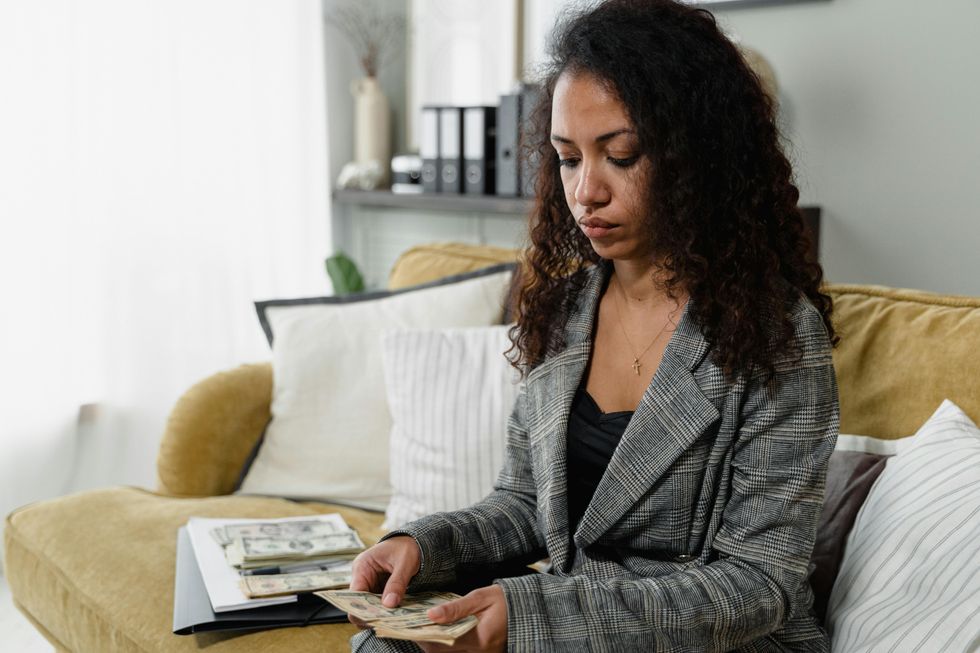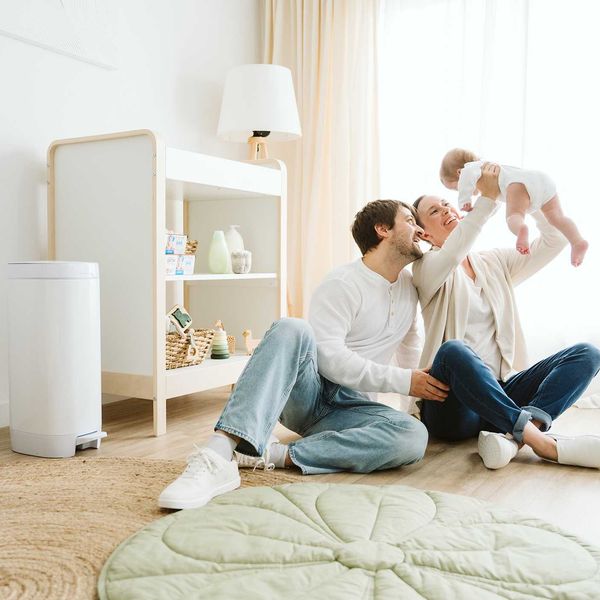You don't have to navigate childcare alone.
4 Helpful Tips To Find The Right Childcare For Your Family In 2024

Staff Writer, Jasmine Williams, covers a variety of topics from home decor to beauty and everything in between. She has bylines at Motherly, The Everymom, and Byrdie where she wrote about motherhood, beauty, health and relationships. Jasmine knew she wanted to be a writer when she realized she was actually interested in reading the articles in her mom's favorite magazines — and she may or may not have ripped her favorite articles out to study them later. When she's not working, you can find Jasmine playing make-believe with her toddler, spending an undisclosed amount of time in Target or TJ Maxx, and searching for a family-friendly puppy to add to her family.
According to American Progress, 2.7 million parents have had to approach working differently because of "issues with childcare." It's something I'm all too familiar with and wouldn't wish on my worst enemy — that's how serious it can be.
If parents aren't dealing with miscommunication from their children's childcare option, then there's often a high tuition costs associated with having extra assistance while they work. Though it's all too popular to tell parents they should've planned better, it dismisses the reality that 3 in 5 working adults are seeing a discrepancy between income increases and inflation.
It's partially why 48% of parents feel it's impossible to find childcare they can trust, according to KinderCare's Parent Confidence Index. That's rather high considering how many working parents have to rely on outside care in a world where support villages look vastly different compared to how they did in the '90s.
Though it's impossible to fix childcare issues in one day, I reached out to Stephanie Fornaro, Founder and CEO of Hello, Nanny, to help parents weigh their options in what feels like a bleak climate.
What are the differences between choosing a daycare facility as opposed to a nanny or au pair?

Pavel Danilyuk/Pexels
I used to believe that all childcare options were created equal, but experience has shown me how untrue that is. The reason so many options exist is simple. Fornaro says, "Each approach offers unique benefits that may be better suited for different family needs and preferences."
"Nannies typically have backgrounds in early childhood education and can even hold specialized credentials like ABA therapy. Nannies also provide one-on-one, personalized care and allow families greater control over daily schedules and caregiving methods," she explains.
However, if you're looking at a daycare center, you may be wondering how childcare would differ there. Fornaro says, "Daycare centers, on the other hand, offer a more structured, social environment for children. While families have less control over caregivers and schedules, daycare can foster important developmental milestones through group activities and interactions."
Finally, au pairs truly have a different background from nannies and daycare centers. "Au pairs, often young individuals looking to travel and experience a new culture, can be a flexible international childcare solution. The level of childcare expertise can vary more widely with au pairs compared to professional nannies," says Fornaro.
What important questions should parents ask when visiting or interviewing childcare options?

Lucie Liz/Pexels
You can choose to ask google what kind of questions you should be asking before choosing a childcare option for your child, but Fornaro's been kind enough to break this down for you.
Questions To Ask Nannies
During the preliminary screening, Fornaro says you should:
- Review resumes and references to assess qualifications
- Conduct background checks to identify any red flags
From there, the essential questions she suggests asking about a nanny's work experience and qualifications are as follows:
- Ask about their childcare work experience, strengths/weaknesses, and motivations
- Explore their work history, reasons for leaving past jobs, and get references
- Inquire about relevant training, certifications, and experience with the child's age group
- Understand their general childcare practices, discipline style, and views on topics like sleep training
- Assess if their approach aligns with your family's values and parenting style
- Determine if they have CPR/first aid training, experience with special needs children, and other relevant skills
- Understand their preferred payment methods and willingness to be paid on payroll

Thirdman/Pexels
Questions To Ask Daycare Centers
Truthfully, I wish I would've had Fornaro's checklist when trying to find suitable daycares for my son because she includes things that truly matter.
Similar to how you should approach interviewing nannies, Fornaro feels you should always do the following:
- Review the daycare's license, accreditations, and inspection reports (please request to review inspection reports)
- Conduct background checks on the staff and facility
From there, you can ask the following:
- Ask about the daycare's years of operation and experience caring for children
- Inquire about the staff's training, certifications, and experience with the age groups you need
- Understand the daycare's staff-to-child ratios and policies around supervision
- Determine if they have specialized programs or curriculum for early childhood development
- Assess their policies and procedures for health, safety, and emergency preparedness
- Evaluate the cleanliness, organization, and child-proofing of the physical space
- Understand their drop-off/pick-up procedures and communication with parents
- Explore their childcare philosophy, discipline methods, and views on topics like nutrition
- Assess if their approach aligns with your family's values and needs
This isn't meant to scare anyone, but a former daycare teacher that my son connected with alerted my S.O. of unreported incidents where our child was on the receiving end of bites and hits from other toddlers...but no one ever mentioned them to us. We'd noticed a change in our son's behavior and knew something was off, but the former teacher's admission and our son's own verbal confirmation is what led us to unenroll him from that center.

Thirdman/Pexels
Questions To Ask Au Pairs
If you decide to choose this childcare option, there's still things that Fornaro suggests you ask during the interview process.
As always, be sure to "review résumés, references, and previous childcare experience" and "conduct thorough background checks, including criminal history and driving records," she stresses.
Once you feel comfortable with the provided information, you ask the following questions:
- Inquire about the au pair's years of childcare experience and age groups they've worked with
- Understand their relevant training, certifications, and credentials in early childhood education
- Explore their motivation for becoming an au pair and their long-term career goals
- Discuss their ability to adapt to your family's culture, routines, and parenting style
- Assess their language proficiency and willingness to learn your family's primary language
- Understand their comfort level with household responsibilities and driving requirements
- Explore their childcare philosophy, discipline methods, and views on topics like nutrition
- Determine if their approach aligns with your family's values and needs
- Understand their ability to engage in age-appropriate activities and foster child development
Because an au pair tends to have a more 'live-in' approach, Fornaro believes you should "Clarify the living situation, schedule, and compensation package for the au pair" and "Discuss their driving experience and comfort level with using your family's vehicles."
Also, she wants you to make sure the au pair is on the same page as their au pair program and is willing to follow all of the required policies.
What childcare costs should parents factor in?

Tima Miroshnichenko/Pexels
Once you have a good idea which childcare option aligns with your family's needs, it's time to focus on tuition costs. They'll differ based on a number of factors like state and the community you live in, but there's no way to get around them TBH.
Daycare Centers
Fornaro agrees and says that tuition and fees for daycare centers are "Dependent on location, quality of the facility, child's age, etc." That means you could be looking at paying anywhere from $800 to $2,000 every month. Not only that, but you'll have to factor in a registration and activity fees, late pickup charges, and more.
Au Pairs
Costs associated with au pairs look a little different. Fornaro says that you'll have to consider:
- Stipend: Typically $200-$300 per week for the au pair, as required by the au pair program.
- Room and board: Providing a private room and meals for the au pair, estimated at $500-$800 per month.
- Agency fees: Initial placement fee of $7,000-$10,000 and annual program fees.
- Transportation: Covering driving lessons, car insurance, and vehicle expenses

Mikhail Nilov/Pexels
Nannies
Though nannies aren't necessarily associated with an agency, there are still things to factor in. Fornaro wants you to look at:
- Hourly rate: Can range from $20 to $30+ per hour, depending on experience, duties, and location.
- Payroll taxes: Families must pay the nanny's share of Social Security, Medicare, and other applicable taxes. 12-15% is pretty standard.
- Understand the difference between gross vs net, and what it means to gross up wages
- Insurance: Liability and workers' compensation insurance may be required, every state is different.
- Paid time off: Families typically provide 1-2 weeks of paid vacation.
- Healthcare stipend
- Mileage Reimbursement if they are using their vehicle for work, transporting children etc.
If this is making your head spin, we're not judging you. It's a lot to consider, but Fornaro says there may be resources that can assist your family with childcare.
"Families may be eligible for the Child and Dependent Care Tax Credit to offset some childcare costs. Also, Flexible Spending Accounts (FSAs) or Dependent Care Assistance Programs (DCAPs) can also help with pre-tax savings," she shares.
How can parents navigate any quilt they may feel for relying on childcare?

Keira Burton/Pexels
I'm certainly no expert, but I know that feeling parental guilt is something that comes and goes. Whether you're worried about the opinions of others or feel afraid of decisions you're making, you're not alone.
"Parenthood is a profound responsibility where parents serve as role models for their children. Providing for one's family is often an essential obligation, not simply a choice. Childcare is frequently a necessity, not a luxury, enabling parents to maintain financial stability and support their children's wellbeing," Fornaro reminds.
Not only that, but she's adamant that childcare isn't a 'bad' thing. "Even for parents who have the option to work or not, they still set an important example by practicing self-care and pursuing their own passions and interests. Children need to witness their parents modeling a healthy work-life balance and the importance of personal fulfillment. As the saying goes, "You can't pour from an empty cup" - parents must prioritize their own physical and mental health to be fully present for their kids," she says.
I've had to learn this the hard way and I can say that there's truly no right or wrong answer when it comes to figuring out if childcare is right for your family. It's one of the reasons Fornaro feels you having support is essential for parents.
"With the right support systems in place, parents can find ways to balance their career aspirations and parental responsibilities. Childhood is a finite season of life, and the example parents set can profoundly shape the paths their children choose to pursue in the future. While some parents may temporarily sacrifice certain personal or professional goals for the sake of their family, it's crucial they don't lose sight of their own sense of purpose. When children eventually grow up and gain independence, parents should feel empowered to rediscover their passions and chart the next chapter of their lives," she says.
Only you can decide what's best for your family whether you work or not. It's the only piece of parenting advice I'm adamant about because the last thing you need is to continue questioning whether you're a good mom or not.
One thing Fornaro wants to add is, "The core lesson is that parenthood is a delicate dance of selflessness and self-care. By modeling a healthy, balanced approach, parents equip their children with the values and resilience to thrive in their own lives down the road."
I couldn't agree more.
Need more parenting tips? Check out our kids section!
Lead image via Yan Krukau/Pexels










